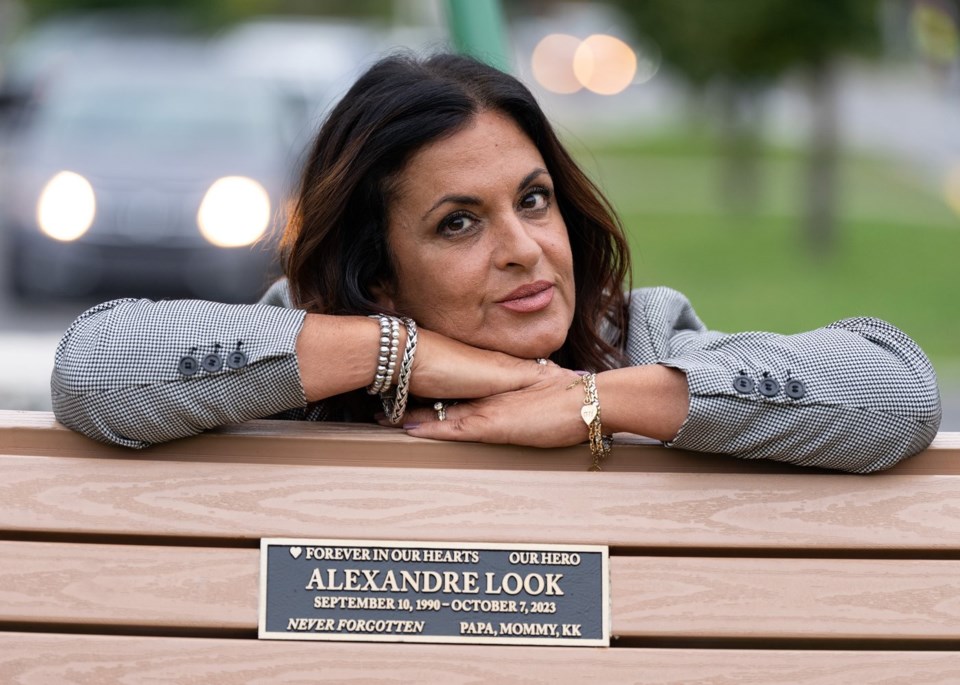MONTREAL — Raquel Ohnona Look wipes back tears when her eyes fall on the plaque in honour of her son Alexandre, affixed to a bench in a suburban Montreal green space that was recently renamed for him.
"Forever in our hearts. Our hero," it reads above his name and the dates of his birth and death — Sept. 10, 1990, to Oct. 7, 2023.
Alexandre Look, a 33-year-old Montreal native, was among the concertgoers who were murdered a year ago Monday at the Supernova music festival during a brutal assault on Israel carried out by Hamas militants. He is among at least eight people, either Canadian citizens or with ties to Canada, who died during the Oct. 7 attacks.
“It's been a tough year. It's a new reality. Our family dynamic changed,” Ohnona Look said in an interview last week, just before Rosh Hashanah. “Obviously he was such a huge persona, and we will never be the same people as we were before Oct. 7."
The day was every parent's worst nightmare, as Ohnona Look and her husband, Alain, bore witness to their son's final moments from their Montreal home. They were on a video call with Alexandre as the Hamas assault unfolded and he huddled in a shelter with about 30 other concertgoers.
His mother heard the gunfire and dropped the phone in shock. His father picked it up to try to understand what was happening. When he heard the Arabic phrase “Allahu akbar,” he knew their son was gone.
Ohnona Look says a year later, the emotions come in waves. "It's a hole in the heart. It's anger. It's trauma, because, you know, having a child murdered, and you're on the phone … it's something you don’t come back from.”
She spent long hours during the past year trying to learn the circumstances around her son's death, speaking to survivors who were in the bunker.
“He was a hero that day," she says she learned. "He sacrificed his life. He put himself in the front of the shelter where they were hiding,” She says survivors described her son trying to keep up their spirits while the terror attack unfolded around them.
He did the same for his mother during their video call, trying to keep her comforted, asking about holiday meals and keeping his tone upbeat. She even heard him trying to reason with the attackers. “But you can't reason with monsters," she says.
In a recent meeting with a first responder who attended to Look’s body, she was able to fill in some gaps that had been haunting her. The first responder said Look was found on top of two people he had tried to protect at the front of the shelter, and he had taken most of the gunshots and grenades. Many survived hiding farther back in the shelter.
"But we know that's Alex, and he would have done that 100 times over," she says. "He was always led by his fearless, gigantic heart. That's how he lived his life."
She says Look was a born salesman who spoke six languages. He had been most recently living in Cabo San Lucas in Mexico, selling cosmetics. He was in Israel on holiday.
After his death, the Look family moved from a nearby Montreal borough back to Côte-St-Luc, a predominantly Jewish suburb where the newly renamed Alexandre Look Place is located. It is next to the Jewish high school he attended and near the synagogue where his father prays every morning.
The community grieved with the family and still does. During an interview with The Canadian Press, at least a dozen people, some of them strangers, stopped to offer hugs, condolences and wishes for a Happy New Year.
Now she wants to ensure that those who were killed on Oct. 7 aren't forgotten — the victims she calls the "Nova Angels" from the music festival as well as those murdered in their kibbutzes.
They include Judih Weinstein Haggai, 70, who held Canadian, Israeli and American citizenships. She died on Oct. 7 while out for a walk with her husband near the Nir Oz kibbutz, which sits less than three kilometres from the Gaza Strip. Their bodies were being held in Gaza and have not been recovered, their daughter has said.
Vivian Silver, 74, died at the Be'eri kibbutz where she lived, which also sits near the border with Gaza. For weeks, officials initially believed the Winnipeg-born woman had been taken into Gaza, but her body was identified in mid-November.
Others found dead immediately after the attack included Look and another Canadian, Ben Mizrachi, 22, of Vancouver.
Hamas also killed dual Israeli Canadian nationals Netta Epstein, 21; Shir Georgy, 22; and Adi Vital-Kaploun, 33. Tiferet Lapidot, 22, an Israeli whose family was from Canada, was also at the music festival and found dead days later.
The emotions remain raw, but Ohnona Look says she's in "warrior mode" in a fight against rising antisemitism and to speak for those still missing.
"I'm doing what my son would want me to do," Ohnona Look says. "I'm the voice for all the forgotten ones, the hostages that still remain … even if there is only bodies, we need their bodies back."
This report by The Canadian Press was first published Oct. 6, 2024.
Sidhartha Banerjee, The Canadian Press

